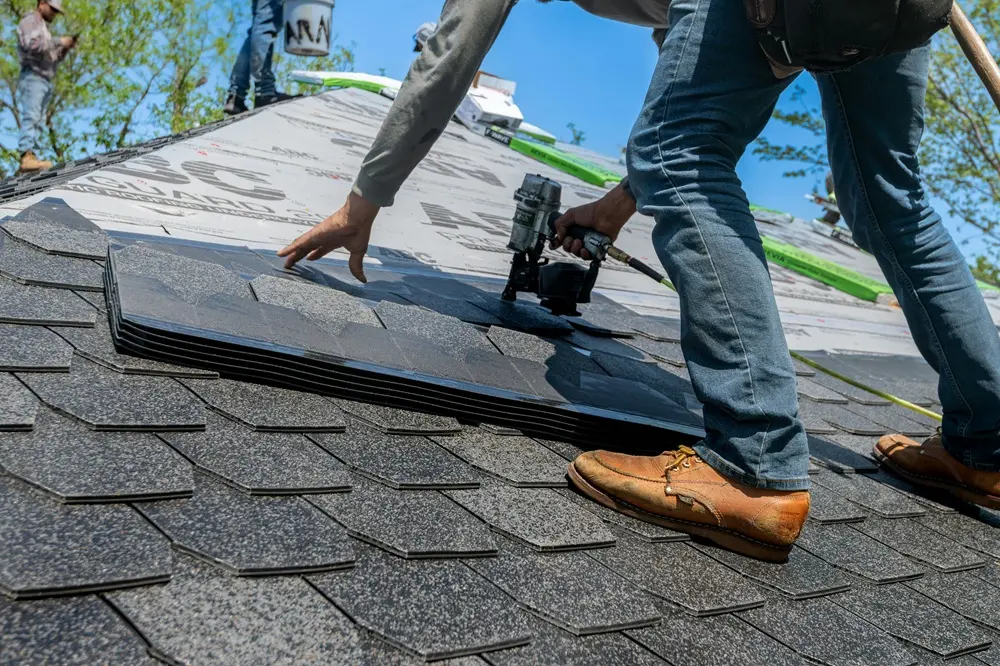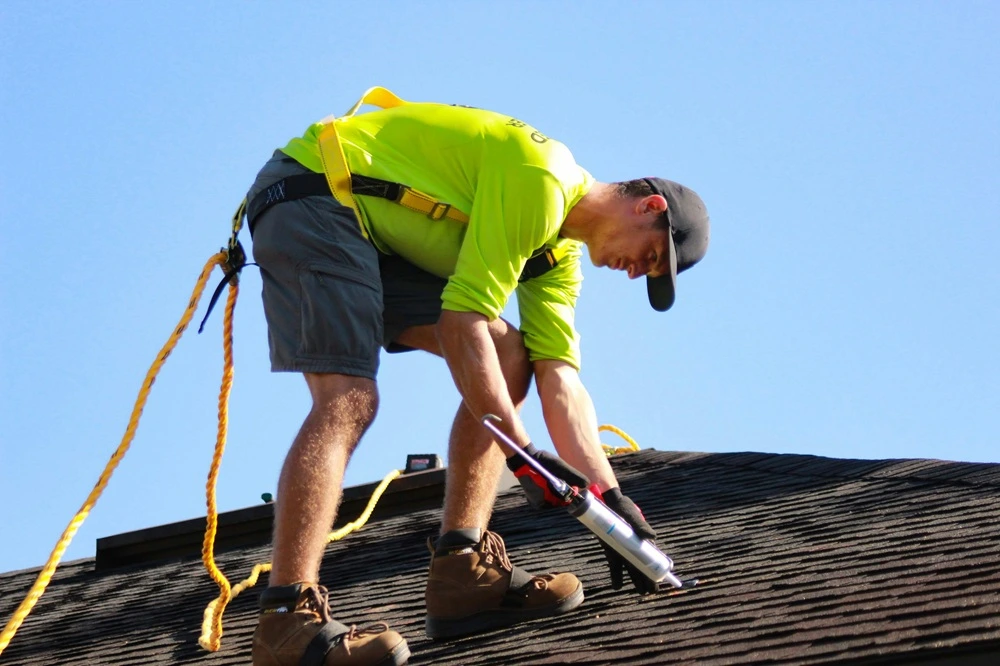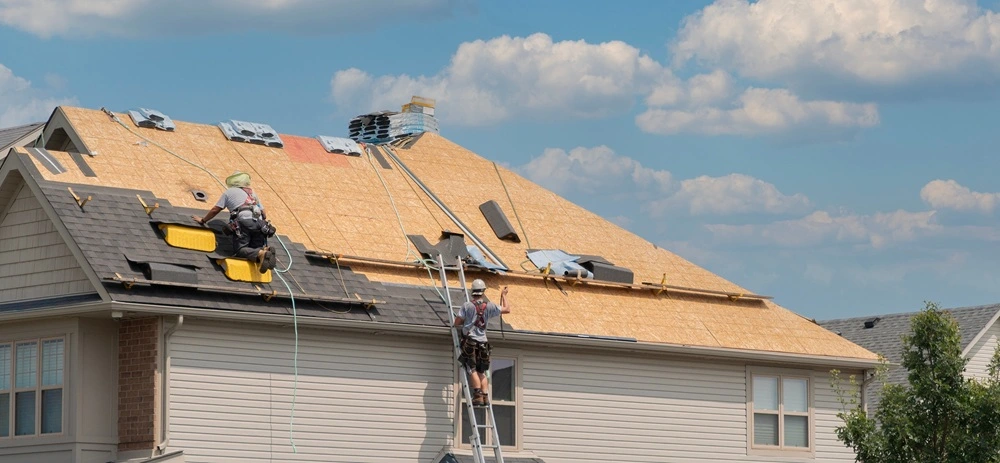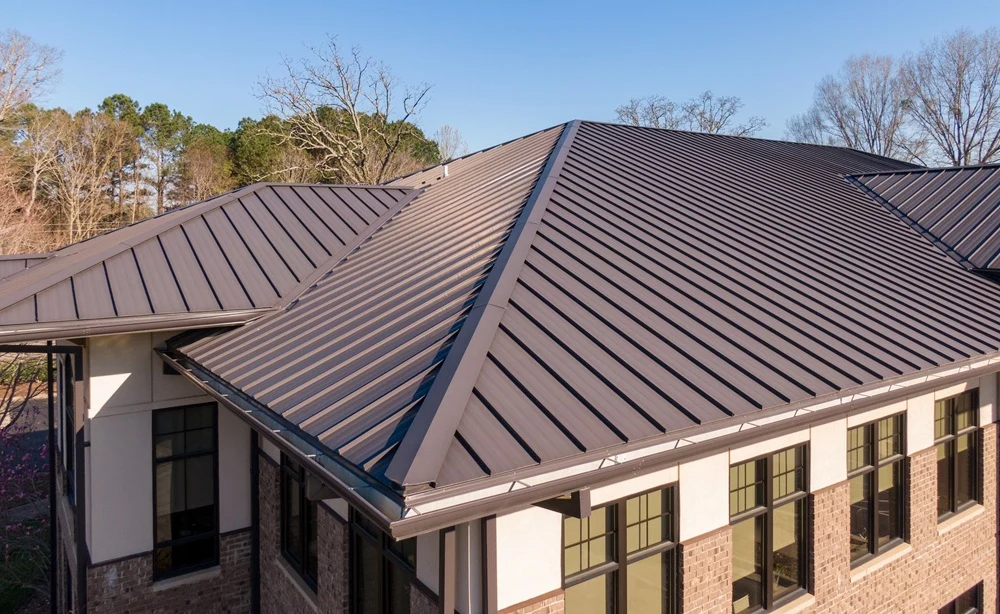Essential Questions for Potential Roofing Contractors
Never settle on a roofer until you’ve worked through these questions. They will quickly show you who runs a professional business and who might cut corners.
1. Are You Licensed, Bonded, and Insured?
This should always be your first question. Proper paperwork protects you from liability and shows that the contractor meets the minimum legal standards. A professional roofer should have no problem sharing proof of licenses and insurance when you ask.
What you should expect: A valid state contractor’s license for larger projects, active liability insurance, workers' compensation coverage for all workers, and bonding paperwork available on request.
2. How Long Have You Been in Business Locally?
Experience matters, and so does local presence. A roofing company with years in the same community has weathered business ups and downs and knows the local codes and suppliers. Contractors who only work out of trucks or bounce from place to place often vanish when problems show up.
What you should expect: 10+ years in business, a physical office, positive reviews with the Better Business Bureau, and strong relationships with local suppliers and building departments.

3. Can You Provide Recent Local References?
Quality contractors build their reputation through satisfied past customers who are willing to share their experiences. References from recent projects give you insight into the contractor's current work quality, communication style, and project management abilities. Check out our portfolio to see examples of professional roofing work.
What you should expect: Five to ten recent references, addresses of completed jobs you can view in person, and past clients willing to discuss communication, cleanup, and scheduling.
4. Are You Certified by Roofing Material Manufacturers?
Certifications from manufacturers set professional roofers apart from general contractors who only work on roofs occasionally. Leading companies such as GAF require proof of training, installation skill, and customer service standards before granting approval. These credentials also make stronger warranty options available for your project.
What you should expect: Current certifications with major shingle manufacturers, an explanation of what those certifications mean for your installation, and access to extended warranty programs.
5. What’s Your Workmanship Warranty?
A contractor's workmanship warranty reveals how confident a contractor is in their installation and whether they stand behind their labor. This type of warranty covers mistakes made during installation, which is separate from the manufacturer’s material coverage. Contractors who only provide short warranties may not fully trust the quality of their own crews.
What you should expect: At least a ten-year workmanship warranty, written terms that clearly outline coverage, and a local office you can contact for future support.

6. Can You Provide a Detailed Written Estimate?
Professional contractors issue clear, detailed estimates that protect both sides and prove their attention to planning. A strong estimate demonstrates that the contractor understands every part of the project and allows you to compare roofing companies fairly. Relying on verbal estimates leaves too much room for hidden costs and miscommunication.
What you should expect: An itemized proposal with materials, labor, start and finish dates, permit details, a cleanup plan, and straightforward payment terms.
7. How Do You Handle Building Permits and Code Compliance?
Most roofing projects require building permits to ensure work meets local building codes and safety standards. Tennessee requires building permits for most roof replacement work, and proper permits protect your home's resale value while ensuring safe installation. Contractors who suggest skipping permits put your investment at risk.
What you should expect: Full handling of the permit process and fees, coordination with local inspectors, up-to-date knowledge of local codes, and final inspection documents once the work is complete.
8. What Type of Roofing Materials Do You Recommend and Why?
Experienced contractors should walk you through different material options and explain which products make sense for your home. Factors include your home’s design, the regional climate, your budget, and how much long-term maintenance you want. Common roofing materials include:
- Asphalt shingles (architectural and three-tab)
- Metal roofing (standing seam and corrugated)
- Slate and synthetic slate
- Cedar shakes and shingles
- Tile (clay and concrete)
What you should expect: Clear guidance on material pros and cons, energy efficiency, maintenance needs, and available manufacturer warranties.

9. How Do You Protect My Property During Construction?
Roofing jobs involve heavy materials and debris, so careful planning is needed to avoid damage. A professional roofer will take steps to safeguard your landscaping, vehicles, outdoor furniture, and the rest of your home during the work. These protective measures show attention to detail and respect for your property.
What you should expect: Protective tarps for landscaping, gutter shields, magnetic nail cleanup, designated staging areas, and daily removal of debris.
10. What’s Your Payment Schedule, and What Payment Methods Do You Accept?
Clear payment terms protect you from scams while also making sure the contractor has the funds to manage the project. Reputable roofers do not require full payment up front and usually offer several payment options, including financing for qualified homeowners. Be cautious if someone insists on cash or large payments before starting.
What you should expect: A small initial deposit, progress payments tied to milestones, final payment at project completion, and flexible choices such as credit cards or financing.
#cta_here
11. How Long Will My Roofing Project Take?
Realistic timeline expectations help you plan around the roofing project and identify contractors who might be overpromising quick completion. Weather conditions, material availability, and project complexity all affect timing. Contractors juggling multiple jobs simultaneously often experience delays that extend the project timeline.
What you should expect: A realistic timeline based on roof size, crew availability, expected work hours, and an estimate that factors in possible weather delays.
12. How Do You Handle Weather Delays and Unexpected Issues?
Weather delays are common in roofing work, and how contractors handle these situations reveals their professionalism and planning abilities. Inclement weather can halt work for days, making temporary protection and clear communication critical. Understanding the best time to replace your roof helps you plan around seasonal weather patterns.
What you should expect: Clear updates about delays, strong temporary coverings for exposed areas, a plan for repairing hidden roof deck problems, and written change order procedures.

13. What Does Your Cleanup Process Include?
Replacing a roof creates a large amount of debris, including shingles, nails, and packaging that can damage property or injure people if it is left behind. A thorough cleanup is part of professional service and should always be included in the total cost of your project. You should never be charged extra for it.
What you should expect: Daily removal of debris, magnetic sweeps to collect nails, proper disposal of all old materials, gutter cleaning, and a final walkthrough with you to confirm the site is clean.
14. How Do You Handle Roof Deck Inspection and Repairs?
The roof deck provides the structural foundation for your new roof and must be in good condition for proper installation. Hidden damage from water intrusion, age, or previous improper installation is common and affects project costs. Professional contractors inspect the entire roof deck before installation begins and check for roof damage that needs repair.
What you should expect: A full inspection of the deck, clear explanations of problems, upfront repair pricing, use of the correct replacement materials, and documentation for your warranty records.
15. If There's a Problem After Completion, How Do I Reach You?
Even excellent contractors occasionally encounter post-project issues that need attention. How they handle warranty situations and customer service reveals their commitment to long-term customer relationships. Understanding the roof insurance claim process also helps if storm damage occurs after your roof installation.
What you should expect: Contact info for the owner or manager, clear warranty claim steps, 24/7 emergency support, written warranty terms, and a local presence for future service.

Warning Signs That Signal Trouble Ahead
While asking these questions, watch for these warning signs that indicate you should keep looking for a better contractor. Understanding common roofing scams helps you avoid contractors who prey on unsuspecting homeowners.
- Storm chasers: Be cautious of door-to-door roofers who show up after storms. Reputable local contractors rely on referrals, not aggressive sales tactics.
- Pressure tactics: Watch out for contractors who push you into same-day decisions, claim their price is only valid immediately, or discourage you from seeking other bids.
- Pricing red flags: Understanding typical roof replacement cost helps spot bids that are unusually high or low. Very low estimates often signal shortcuts or surprise charges later on.
- Poor communication: Contractors who are difficult to reach, don't return calls promptly, or seem unprofessional in their communications will likely provide poor project management.
- No online presence: In today's digital age, legitimate contractors should have websites, online reviews, and social media presence. No online footprint is suspicious.
These issues often point to contractors without proper licensing, insurance, or commitment to long-term quality.
Final Checklist: How to Choose a Roofer Before Hiring
Before you make a final choice, use this checklist to confirm you’ve carefully reviewed each candidate. Taking the time now helps prevent costly mistakes and ensures your roof is installed correctly.
- Verify credentials: Check that the contractor has a valid license, current insurance coverage, and bonding documentation on file with state authorities.
- Check references: Speak with recent clients about the quality of work, adherence to timelines, communication, and cleanup.
- Compare written estimates: Look at detailed proposals from at least three contractors, including labor, materials, timeline, and total costs.
- Confirm timeline: Ask for start and completion dates in writing, along with plans for dealing with delays or complications.
- Clarify communication: Identify your main point of contact and how often you will receive updates during the project.
- Review payment terms: Understand deposit amounts, progress payments, final payment timing, and accepted payment methods.
Do not base your decision only on price. The right contractor combines fair pricing with proper licensing, strong insurance, quality materials, and a track record in the community.










